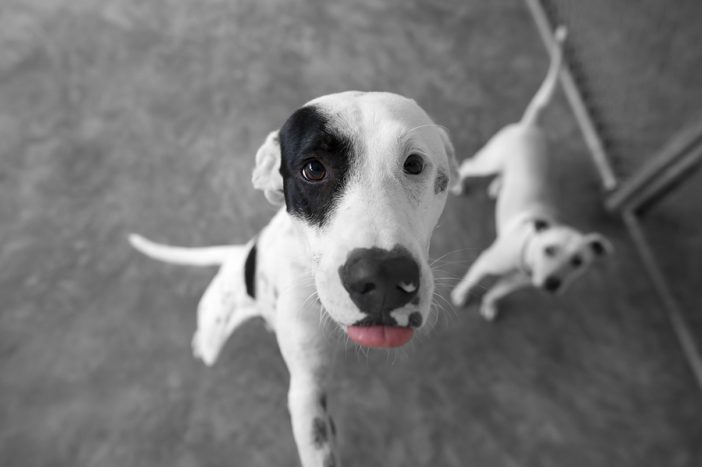
I read an interesting post today on my social media page. It said:
“I continue to see rescues treat people in a way that will sadly keep irresponsible breeders and pet stores in business.”
Before you judge that statement, this person is heavily into rescue. I’m involved with rescue and I have more friends than I can count in it. I am a fan of tons of rescues and individual animals. However, I totally get her post and there are many who agree.

Of course, this statement is not about all rescues. I do believe we must take a step back every so often and do a reset, much like a dog shaking it off. I attended an animal shelter worker seminar years ago and the speaker asked us to raise our hands while he asked several questions. These questions were yes or no questions with no room for offering explanation. As we responded, the speaker would choose specific people to put their hands down based on their response.
We were asked if we had a fenced in yard, if we let our cats go outside, if we had kids, if we had other animals, if we lived in apartments, if our animals were home alone for more than four hours, if every one of our animals was up to date on vaccinations, had a recent fecal screening, were on heartworm preventives, flea control and so on. At the end of the questioning, only a few people had their hands still raised. He then revealed he was reading from a collection of adoption applications and only those with their hands still raised would qualify to adopt. Eye opening to say the very least.
He wanted us to see how we unintentionally narrow the chances for animals to find a home. He also read off some adoption fees from rescue groups that ranged from $100 to $500. The adoption fees for shelters ranged from $0 to $200. I have personally experienced interaction with rescue groups who seemed uninterested in my desire to volunteer, adopt or foster. I have also been the person reviewing adoption applications.
Am I Really Helping The Situation?
I turned down an adoption application because the other dog in the house, who was ten years old, was not neutered. I was adamant I was doing the right thing; downright adamant. The people had fallen in love with a dog at the shelter. They had been to the shelter several times meeting with the dog and discussing their decision. When I turned them down the wife started to cry. She told me they didn’t know that neutering their dog meant they were responsible pet owners but I made sure to correct her.
[tweetthis]I Rejected the Perfect Family For the Wrong Reason[/tweetthis]
She expressed that considering the dog’s veterinarian monitored health issues, neuter was considered risky at that point. She also advised me he’d never sired any puppies and was a stray when he joined their family as a young dog. Still, I said no.
A few weeks later they came back to the shelter. I smugly thought they had their dog neutered because of me and I could now approve them. They actually came to show me their new puppy. A puppy they purchased from a pet store because they didn’t have to meet any qualifications to buy him. I had just played a part in supporting a puppy mill.
It never occurred to me how many times I may have caused people to purchase an animal or denied an animal the chance to leave the shelter which didn’t make the space to save another one. Shelters need money to operate and this was a poor business decision because the truth is, shelters stay in business by making money. I wondered if any of my denied applicants adopted elsewhere and continued to donate to that shelter in appreciation.

It made me think about that speaker at the seminar. I have cats who go outside. That immediately disqualifies me to adopt from many shelters or rescues. The adoption process can be daunting to the potential adopters. Maybe that’s why some of my applicants appeared nervous instead of shifty.
Being treated as if the rescue or shelter is doing someone a favor by even considering their application after they have fallen in love with an animal is hurtful. Buying an animal is stress free. It’s also the last thing anyone in the animal field wants to have happen.
Having a little flexibility in no way means handing out animals to people who truly do not qualify for adoption. We work really hard to save animals and place them where we know they will be safe and loved. I started to focus on the interview portion of the application and looked at it as a conversation and not an inquisition.
Sometimes it’s just simple education that’s needed. Not everyone knows what crate training is or that spaying and neutering is by far the best way to prevent unwanted litters or most importantly, buying supports breeders and pet stores. Do all rescues spay or neuter their animals before sending them home? They should. Some people choose to use titers over vaccinations and this results in controversy due to local licensing laws.
They Seemed Perfect But I Was Wrong
I moved on from that fiasco. Then one day brought the perfect adoption application. These people had adopted a pit bull from a rescue that I knew had a grueling adoption process and high fees. They were known for taking on the more challenging dogs and many spent a long time in their rescue because of it. But their devotion to helping the dogs resulted in saved lives. The couple provided impeccable veterinarian records, had tons of land that was all fenced in, wonderful references, and lived alone. They even owned a feed store and took their dog to work with them where he blissfully hung out behind the counter. They chose a puppy we had pulled from the South.

I already had an approved application on my desk but had not yet called the family. But because of this spectacular application, I bumped the people I had just met to get that puppy. I figured because the other applicant had listed a couple of other puppies they were interested in, they would just choose a different one. Instead, the applicant was devastated and decided to hold off on adopting because she didn’t want to put her children through that disappointment again.
Just a week later, the perfect couple walked in with the puppy. I thought they were visiting us but they were actually returning him. They said it wasn’t working out because he was not behaving in the store by staying behind the counter like their other dog. They said he was too hyper and they had changed their minds. I never felt so sick. I was floored. I took the puppy to the back, placed him in the kennel and started sobbing in shame.
I got up and called the other applicant to lie to her again. I told her the other application fell through and the puppy they wanted was available again. She had no animosity. She brought her family down the next day and that puppy went home. She regularly sent pictures of him with the family, loving life and thriving. I had made a poor judgement and while the puppy still had a happy ending, I had just gotten a crash course in compassion fatigue.
Compassion Needs to Extend To People Too
When did I become so full of myself? When did I lose my compassion? I was failing our animals, good people and setting a poor example for my staff. I did a reset and what happened next was, well, actually nothing monumental. I didn’t haphazardly hand out dogs and cats. I didn’t see a rise in returns. I didn’t get any complaints of animal abuse on our adopters. I didn’t see an increase of strays from animals turned loose. I started to treat people as I wanted to be treated myself; a concept we’re taught as children. I even stopped treating people looking to surrender like vermin and listened to their stories. Wasn’t I there to protect the animal first? I had to consider every scenario individually.

I’m not proud of the stories I shared. It just brings me back to the post my online friend made. Is it possible that a suddenly annoying applicant is reacting to our behavior? Is it possible someone with no volunteer experience needs your help to learn? It’s so hard for those of us in rescue not to lose our patience because we’ve heard it all and nothing surprises us anymore. We see the crossposts, we read about animal abuse and there’s a never ending population in need of our help. Most people in rescue don’t receive any payment for what they do. Shelter workers are underpaid. Yet somehow, we keep on keeping on.
I would gladly give up what I do for lack of work. In this field, however, that is highly unlikely.
[tweetthis]I started to treat people as I wanted to be treated myself; a concept we’re taught as children.[/tweetthis]
Originally published on thedodo.com
The views and opinions expressed in this article are those of the author and do not necessarily reflect the position of the DrAndyRoark.com editorial team.
 About the Author
About the Author
Julie LeRoy is a former animal control officer and shelter animal care manager who is also a children’s book author.
 About the Author
About the Author